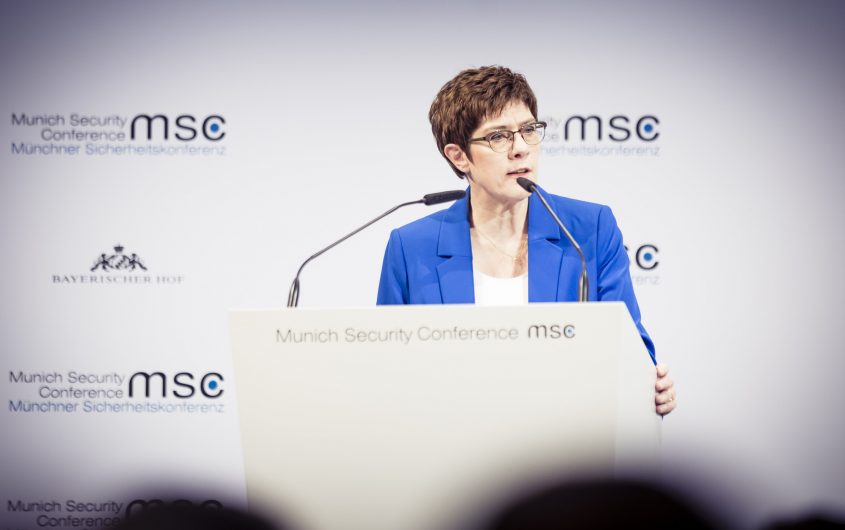
Photo: MSC/Kuhlmann
Yearning for Familiar Wine In Well-Known Bottles

Aylin Matlé
German Council on Foreign Relations
Aylin Matlé is a research fellow with the German Council on Foreign Relations. In that role, she primarily works on German security and defense matters. Previously, she has served as the Deputy Head of the Konrad-Adenauer-Stiftung’s Israel office in Jerusalem.
Aylin Matlé holds a PhD from Martin-Luther-Universität Halle-Wittenberg. Her thesis “Drifting Apart of Transatlantic Security: The American Mark on NATO under Barack Obama” examined the impact of the Obama administration on allied and defense policies of European Alliance members. Dr. Matlé worked as a research associate at the chair of international relations and European politics at the Martin-Luther-Universität from 2014-2016. Prior to that, she completed an MA in War Studies at King’s College London in 2014. She holds a bachelor’s degree in Public Management and Governance from Zeppelin Universität, Friedrichshafen.
She was a Fellow in the American-German Situation Room in 2018. In addition, she participated in the AICGS project “A German-American Dialogue of the Next Generation: Global Responsibility, Joint Engagement” from 2018-2019.
Parsing the leitmotif of this year’s Munich Security Conference (MSC)—Westlessness—is worth the effort as it does not merely equal semantic pondering. The term invented by the organizers of the MSC can be interpreted as an attempt to encapsulate the West’s struggle with its restlessness as it reacts to the shifts occurring in the international order. This is certainly only one interpretation, but it neatly summarizes the developments of previous years in the political West. Last year’s MSC gathering made clear that the Western camp is not speaking with one voice when it comes to international security challenges, including the rise of authoritarian powers and the resulting reemergence of great power rivalries.
At the same time, the remarks delivered by the West’s leaders in 2019 left no room for doubt about the analysis of the current state of world affairs: the erosion of the international world order forged and, until recently, held together by the United States (at least according to many European and German decision-makers). Despite wide agreement on the state of affairs, a united response is still lacking. However, one message came through clearly: The West must react to the powers and challenges it faces—and it must be united. This recap of last year’s MSC is necessary to better understand what this year’s theme conveys: Western democracies are still under attack—figuratively as well as literally—and are eager to react. Alas, large parts of the camp do not know how to react, which explains the lack of united reactions. The resulting confusion is not only apparent in the political West at large, but can be observed at a national level, too, most strikingly in the German foreign, security, and defense establishment’s performance at the MSC earlier this month.
The resulting confusion is not only apparent in the political West at large, but can be observed at a national level, too, most strikingly in the German foreign, security, and defense establishment’s performance at the MSC earlier this month.
In 2019, Chancellor Merkel electrified the audience with her remarks and rebuke to many of President Trump’s policies; this year, Federal President Frank-Walter Steinmeier presented a very similar view of international affairs as Merkel did last year, though his rhetoric was different. Foreign minister Heiko Maas mostly reiterated last year’s message, emphasizing the necessity of strengthening the European Union’s (EU) foreign and security backbone. Without rendering the NATO alliance redundant, he assuaged the concerns of transatlanticists in the room who might fear the reduction of the Alliance’s role in light of attempts to strengthen the EU. One cannot help but wonder how that stipulation ought to be squared with one of his conclusions that Europe must demonstrate strength in the future. It does not require much imagination to deduce from his remarks that Europe’s vigor has to be directed against the United States if necessary. Maas even said as much when he referred to America’s retreat from the world stage as the defining game changer these days.
Annegret Kramp-Karrenbauer (AKK, as she is often referred to), the German defense minister, followed a very similar line as her predecessor last year. According to AKK, “we must defend the West” by turning the Munich consensus of words into a Munich consensus of deeds. To that end, Kramp-Karrenbauer offered a few suggestions, including the continuation of the fight against ISIL together with Germany’s international partners. Notwithstanding her reference to some initiatives in which Germany is already participating, AKK was vague about how to achieve the coordination and organization of defending the West. Admittedly, the task is not an easy one. Yet, the lack of presenting more palpable ideas stood in stark contrast to her own words as she called on her country to put principles into concrete actions. All in all, the German delegation once more offered an image of perplexity, mirroring this year’s motto of the Munich Security Conference. It seems as though Berlin has caught on to the shifts occurring in the international system—most worryingly for Germany being the recalibrated role of the United States—and even understands that speedy reactions are required. The country’s decision-makers know how to talk the talk, but not yet how to walk the walk. Instead, Berlin gives the impression that it would like to return to bygone cozier times when Germany was able to drink familiar (transatlantic) wine from well-known bottles (made in the U.S.).









